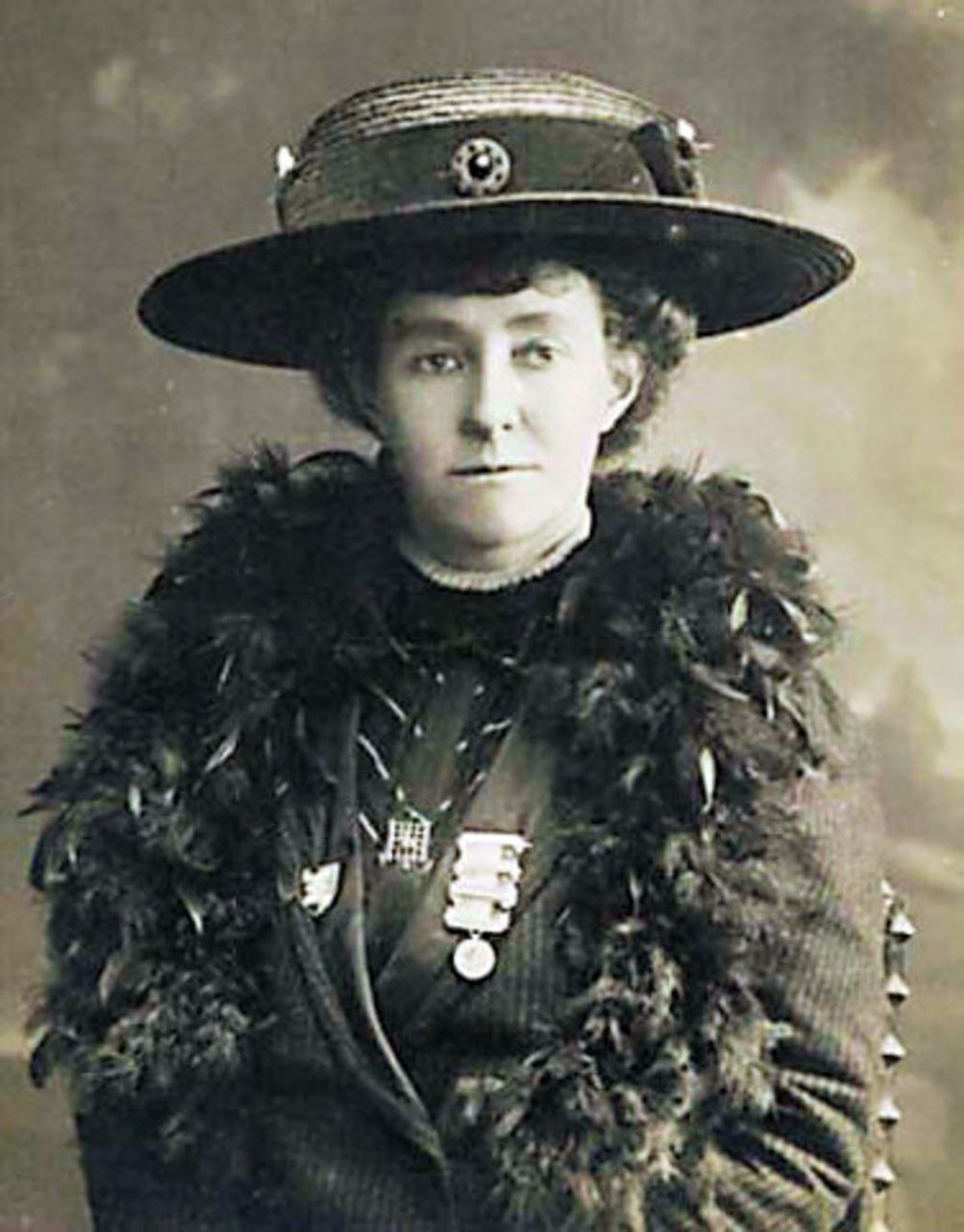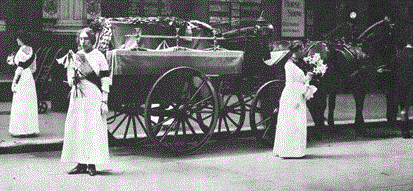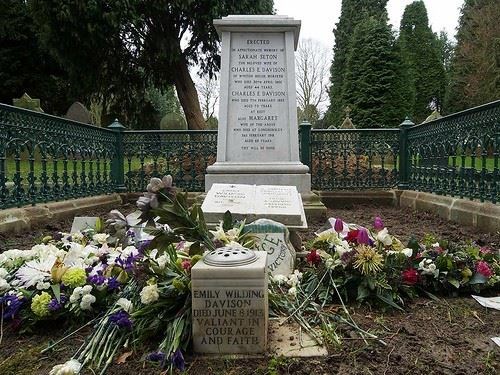Emily Wilding Davison was a suffragette who fought for women to gain the right to vote. She was a member of the WSPU and died for the cause.
"Deeds Not Words" - the WSPU Slogan
 Emily Wilding Davisonhttps://en.wikipedia.org/wiki/Emily_Davison
Emily Wilding Davisonhttps://en.wikipedia.org/wiki/Emily_Davison
Jumping in front of a horse to pin a flag onto a bridle would be considered mad at any time period. Yet, this is what Emily Wilding Davison did. She died being trampled on during a derby, trying to pin the WSPU flag onto a horse. In the eyes of many, she was mad, utterly crazy to go to such great lengths to gain equality for women, yet she still possesses many great qualities that make her a hero. Emily Wilding Davison lived in a time where suffrage was in its height, and those who supported it were considered insane to even think women could be thought of as equal to men. Born in Britain in 1872, she was a bright student, who eventually went into the field of teaching. While spending her spare time working for social and political change, she became a rapt supporter of the suffrage movement, which was essentially the movement for women to gain the right to vote. Davison demonstrates many characteristics that prove she’s a hero, such as determination and selflessness. She had an unwavering will to improve the lives of all women, shown by her acts that endangered her life. In addition, her selflessness allowed her to be willing to go through great lengths to let others gain the equality she always craved. Davison’s unwavering strength and altruistic actions brought the suffrage movement towards new heights.
Emily Wilding Davison’s determination helped release women from the oppression they suffered throughout the generations: “Soon after that she became one of the scores of WSPU activists arrested, tried, and convicted on public disturbance charges… in order to call attention to their plight and the injustice of being incarcerated for demanding the right to participate in political life…” (“Emily Davison” 5). Davison was determined to help the WSPU’s cause. She was sent to prison multiple times after she joined the organization, which displayed her willingness to have her freedom taken away to break down societies preconception of women. To do that, she had to create attention-grabbing situations that would leave the public with no choice but to see the inequality women faced daily. She did these illegal activities with vigor to see the waves it would make in society. She knew the consequences of her actions, and the potential chaos and turmoil it could make in her life, yet she still pressed on to make a difference in the lives of all women. In addition to all the risks she took with her personal life and freedom, she also put her physical health in danger. She made it known that her physical well being would not be a defining factor in her choice to continue her participation in the movement. Her disregard towards her health proved to be a unique characteristic, which highlights her fearless determination to gain equality: “During her imprisonment… she and other activists were being force-fed… she threw herself down an iron staircase in protest” (Penny 5). This emphasizes her commitment to the movement and her beliefs, and the sense that she was willing to endure torture and degradation to ensure the women around her would gain equal rights. Her physical health was second in regards to raising the oppression from women. Her determination allowed her to rise above the abuse and humiliation and never bowed down to the obstacles in her path. Davison had determination in spades as shown by her many acts against the unjust treatment of women in society. She put everything on the line to see the change occur so that fellow women could gain the proper access to all aspects of political and social life. Emily Davison's Funeralhttps://www.historylearningsite.co.uk/the-role-of-british-women-in-the-twentieth-century/emily-wilding-davison/
Emily Davison's Funeralhttps://www.historylearningsite.co.uk/the-role-of-british-women-in-the-twentieth-century/emily-wilding-davison/
Sacrifice was something Davison believed to be necessary to let women gain equal footing in society; she was selfless in her pursuit of social freedom for women. She was willing to have her life snuffed out just for the chance for equal rights: "When I attempted to commit suicide in Holloway prison on June 22 I did it deliberately and with all my power because I felt that by nothing but sacrifice of human life would the nation be brought to realize the horrible torture our women face…” (“Emily Davison” 8). Davison felt that the nation was treating the issue of women’s rights too lightly. She wanted to open people’s eyes to the everyday injustices women faced. Davison felt that until people realized what was at risk if women were not granted equality, the situation would never change. She believed that only something as disturbing as suicide would create the push needed to alert the country to change. Davison also faced many different challenges to her radical belief that the plight of women needed to change. One of the most difficult was her time spent in prison for the activities she had participated in with other WSPU members: “The grudging account of the women's liberation movement in official histories refers to force-feeding, but edits out the full extent of the torture of activists who were considered mad terrorists for asking that the state treat women of all classes as rational human beings” (Penny 3). The WSPU, including Davison, thought that the more traditional ways of protest weren’t bringing about the change they wanted fast enough, so they created more extreme measures that created change but at the cost of their well being. Their willingness to go through torture showed a desire to sacrifice themselves for the greater good. One of Davison’s core characteristics was being selfless, which pushed her along the path of being a valuable WSPU member and of becoming the epitome of their saying “Deeds Not Words.”
 Emily Davison's Gravehttps://www.moreinmorpeth.co.uk/visit/the-grave-of-emily-wilding-davison
Emily Davison's Gravehttps://www.moreinmorpeth.co.uk/visit/the-grave-of-emily-wilding-davison
Davison’s many acts within the suffrage movement were meant to call attention to the inequality women faced. Instead of giving up, she continued to fight for others, proving she was determined and selfless. Her many strong characteristics put her on a path of fighting for equality. Her determination and selflessness led to her risking her well-being, both physically and emotionally, for what she believed in. Emily Wilding Davison was amazing. She strove to make a change for all women across time. Not only did she give her life to the cause, she also put herself under a great amount of emotional and physical strain during her lifetime to accomplish this. Davison didn’t stop trying to gain equality for women, even when society called her mad for even considering the idea that women could ever stand on equal ground as men. She saw herself and other women as something great. Emily Davison left a permanent mark in history and paved a road for future women activists to walk on.
Works Cited
"Emily Davison." Encyclopedia of World Biography, vol. 34, Gale, 2014. Biography in Context,
https://link.galegroup.com/apps/doc/K1631010067/BIC1?u=powa9245&xid=8e9f73f1. Accessed 4 Feb. 2018.
Gullickson, Gay L. "Emily Wilding Davison: secular martyr?" Social Research, vol. 75, no. 2,
2008, p. 461+. Biography in Context, https://link.galegroup.com/apps/doc/A183043386/BIC1?u=powa9245&xid=ffb5ba46. Accessed 24 Jan. 2018.
Penny, Laurie. "Emily Wilding Davison was not mad: she made the only choice she could bear."
New Statesman, 24 May 2013, p. 19. Biography in Context, https://link.galegroup.com/apps/doc/A333742790/BIC1?u=powa9245&xid=abc223a9. Accessed 24 Jan. 2018.
Trueman, Chris. “Emily Wilding Davison.” History Learning Site, History Learning Site, 17
Page created on 2/13/2018 5:40:31 PM
Last edited 8/25/2021 10:31:17 AM
